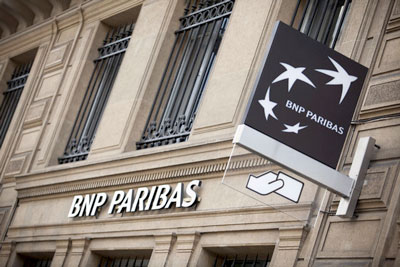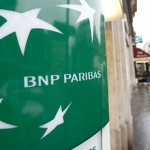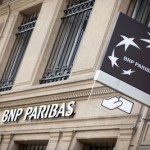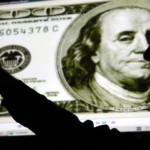BNP Keeps Investors Guessing About U.S. Sanctions Penalty

BNP Paribas SA (BNP) has given investors scant information about how much it expects to pay to settle a criminal probe of U.S. sanctions violations.
The bank told shareholders at an annual meeting on May 14 that the settlement could be significantly more than the $1.1 billion it had set aside for the case. On May 29, Bloomberg News reported that U.S. authorities have demanded more than $10 billion, citing a person familiar with the matter. Since then, the bank hasn’t provided additional information about the possible size of a settlement.
BNP Paribas isn’t required under international or U.S. accounting standards to disclose more. Analysts including Jean Pierre Lambert at Keefe, Bruyette & Woods Ltd. are saying what the bank has not: the penalty could wipe out dividends and weigh on future earnings.
Jordan Thomas, a partner at law firm Labaton Sucharow, which has represented banks’ shareholders, said the discrepancy between BNP’s disclosures and reports of a possible $10 billion settlement suggests the bank hasn’t said enough.
“There’s no question that investors who purchased the stock in recent months would have wanted to know the true scope of the problem,” said Thomas, who previously worked as a trial lawyer at the Securities and Exchange Commission.
BNP Paribas, France’s largest bank, is scheduled to report earnings on July 31. The lender, which has said it’s cooperating with U.S. authorities, declined to comment on the investigation and its disclosures.
Companies have traditionally been reluctant to disclose too much about pending litigation, saying that it undermines their negotiating position by tipping the other side as to the minimum they expect to pay.
‘Heroically Difficult’
BNP’s provision of $1.1 billion, which was disclosed in an audited annual report in February, wasn’t based on negotiations with prosecutors, the bank has said. The figure is generally in line with other banks’ settlements over U.S. sanctions violations.
Standard Chartered Plc was fined $667 million in 2012 for its dealings in sanctioned countries. HSBC Holdings Plc agreed to pay $1.9 billion that year for sanctions violations and money laundering.
“It can be heroically difficult to accurately assess how a litigation will turn out,” said Michael Young, head of the securities litigation and enforcement practice at Willkie Farr & Gallagher LLP. “A company is called upon to try to predict the outcome often long before it has any realistic sense as to what will happen.”
About two months after disclosing the $1.1 billion provision, BNP Paribas said the penalty could be much higher without providing a revised number.
Forthcoming Enough
French officials say BNP Paribas has been forthcoming enough.
“One can hardly hold it against BNP Paribas that it doesn’t know what the American justice system wants it to pay given that this amount seems to be fluctuating,” Gerard Rameix, president of France’s market regulator, said June 2. Francois Chaulet, who helps manage 400 million euros ($542 million) at Montsegur Finance in Paris and invests in BNP Paribas stock, agrees that the bank has disclosed as much as it could about the negotiations. The uncertainty around the size of the fine still puts investors in a difficult position, according to Chaulet.
“Investors are left in limbo,” he said.
‘Significant Volume’
Investigators first learned of BNP’s dealings with sanctioned countries from an individual who reported the alleged misconduct in 2007, people familiar with the matter said this month. Since then, they have been reviewing transactions made by the bank’s commodities-trade financing business involving Sudan, Iran and Cuba, they said.
BNP, based in Paris, first disclosed the probe in 2010, saying it had discussed with U.S. authorities an internal review of “certain U.S. dollar payments involving countries, persons or entities” subject to sanctions.
In March 2013, the bank provided more information, saying that its internal review covered “a significant volume” of U.S. dollar transactions with sanctioned countries.
Almost a year later, on Feb. 13, BNP Paribas disclosed that it had set aside $1.1 billion for the case. That same day, Chief Financial Officer Lars Machenil said in an interview with Bloomberg Television that the final settlement “could be very different from the one we have provisioned.” The shares dropped almost 5 percent.
‘High Uncertainty’
BNP Paribas Chief Executive Jean-Laurent Bonnafe told investors May 14 that resolving the probe is a “top priority” and that there was “very high uncertainty over the sanctions and namely over the amount of the penalty.”
Later that month, Bloomberg News and other media reported that prosecutors were seeking more than $10 billion from BNP Paribas to settle the case. The bank’s shares dropped more than 6 percent on the reports and are down by about 15 percent since the bank’s February announcement.
If the settlement reaches $10 billion, the bank may consider skipping its 2014 dividend and cutting bonuses for corporate and investment banking staff, according to KBW’s Lambert.
Internal Reviews
Since BNP’s February disclosure, the Justice Department has stepped up its rhetoric about holding large banks accountable for wrongdoing. Attorney General Eric Holder signaled May 5 that prosecutors were seeking guilty pleas from banks in certain cases, a departure from the department’s previous approach. Some analysts say that BNP Paribas couldn’t have foreseen that shift.
“There is no real ground to say that they were under-provisioned,” said Jon Peace, a London-based analyst at Nomura Holdings Inc. with a neutral rating on BNP’s shares. “This is an exceptional issue with an acceleration they did not expect.”
Separately, France’s second- and third-biggest banks also face U.S. sanctions probes. Societe Generale SA (GLE) and Credit Agricole (ACA) SA are each conducting internal reviews and cooperating with U.S. authorities over dollar transactions involving embargoed countries. Societe Generale disclosed an investigation last year and didn’t elaborate in its most recent filing in March.
Credit Agricole disclosed its internal probe more than four years ago — before BNP Paribas disclosed its review — and still hasn’t said how much a settlement could cost. In March, the bank said it’s “currently not possible to know the outcome” of the reviews and that the U.S. could impose financial penalties “as they have done for other financial institutions.”
Recognizing Losses
BNP Paribas, which is publicly listed in France, has to comply with international accounting rules, which say companies have to recognize losses that are probable and can be estimated. European rules define probable as having more than a 50 percent chance of happening, said Joyce van der Laan Smith, an accounting professor at the University of Richmond. If the loss can only be estimated as a range, companies are allowed to pick the middle value.
U.S. standards define probable as having a greater than 70 percent chance of occurring, meaning a loss may be recognized earlier under the international rules.
U.S. regulators have occasionally campaigned to tighten such disclosures. In 2011, the SEC sent letters to Bank of America Corp., Citigroup Inc., and Wells Fargo & Co. questioning whether they disclosed enough about litigation risks related to their mortgage-backed securities business.
‘Uncomfortable Situation’
If prosecutors get their way, a settlement with BNP Paribas will not only mark a record for sanctions violations but also for corporate criminal penalties overall. Prosecutors argue that a more severe penalty against BNP Paribas is justified because the misconduct was more egregious and the bank didn’t fully cooperate with the investigation, people with knowledge of the probe have said this month.
The bank has said it’s cooperating with U.S. authorities. Bank of France Governor Christian Noyer has said BNP Paribas didn’t violate French or European rules.
“BNP is in an uncomfortable situation,” said KBW’s Lambert. “Either they indicate that the fine is easily absorbable, and this would trigger maybe a higher penalty from U.S. authorities, or the bank indicates that the fine is damaging, which may potentially lead to the loss of clients’ business.”
Source: bloomberg



























